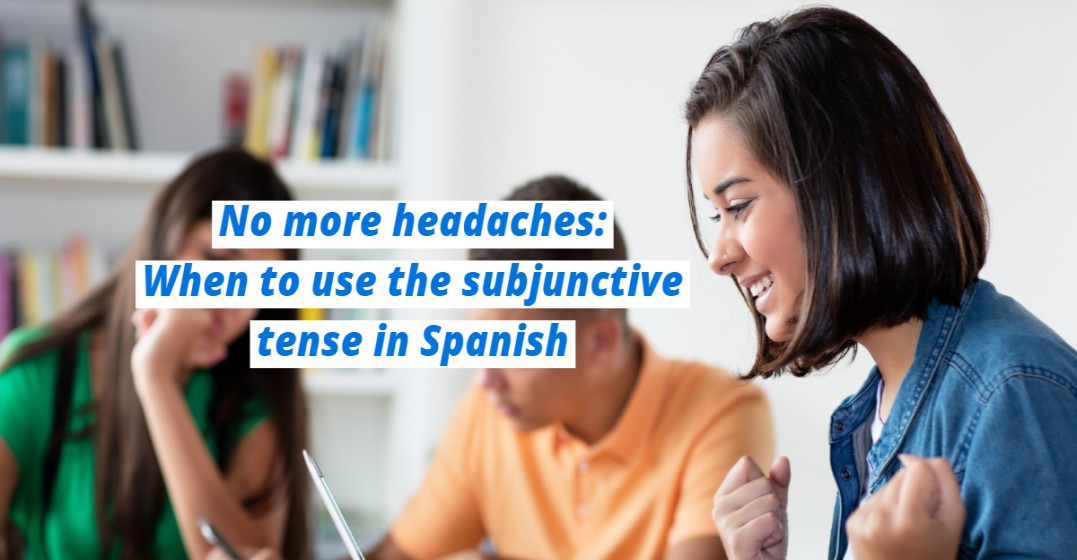When to Use the Subjunctive Tense in Spanish

No more headaches: When to use the subjunctive tense in Spanish
The subjunctive in Spanish used to give me headaches. As I’ve shared before, I grew up functionally bilingual. I spoke Spanish and English at home with my family but I never learned proper Spanish grammar until school. When I began Spanish classes at the age of 12, I was shocked at how hard it was. I tell Spanish learners my background because I want to reiterate: Spanish tenses can be wild. For native English speakers, some of the language tenses common in Spanish have dropped out of everyday use in English. This is the case with the subjunctive tense. Sure, it exists in English. We know how to use it, but it is not part of our everyday language. Once you understand how the tense works in English, it becomes simple to master subjunctive in Spanish. Let’s break down how and when to use the subjunctive tense.
Subjunctive in English
The subjunctive tense is a verb form that explores conditional or imaginary situations. It also expresses wishes, demands, and suggestions. These sentences all use subjunctive tense.- I wish for my mother to be queen so that I would be a princess.
- I doubt that you shall inherit a lot of money and build yourself a large mansion.
When to use it!
Much more common in daily use, the subjunctive in Spanish talks about more than imaginary situations. It also expresses opinions, doubts, the abstract, and emotions. Here are the example phrases from above written in Spanish.- Quiero que mi mamá sea la reina para que yo sea una princesa.
- Dudo que heredes mucho dinero y te construyas una gran mansión.
Subjunctive in Spanish
The basic form of a present subjunctive verb in Spanish is made by following these steps.
|
hablar | tener |
| 2. Find the present indicative yo form | hablo | tengo |
| 3. Remove the yo ending | habl- | teng- |
| 4. Add the subjunctive ending. | hable hables hable hablemos hablen | tenga tengas tenga tengamos tengan |
Irregular Spanish verbs in the present subjunctive tense
There are six irregular verbs in the subjunctive tense for Latin American usage.- Dar – dé, des, dé, demos, den
- Estar – esté, estés, esté, estemos, estén
- Ser – sea, seas, sea, seamos, sean
- Haber – haya, hayas, haya, hayamos, hayan
- Ir – vaya, vayas, vaya, vayamos, vayan
- Saber – sepa, sepas, sepa, sepamos, sepan
Still uncertain about it?
Take these two phrases:- “I believe” expresses certainty.
- “I don’t believe” expresses doubt.
- Creo que esta enciclopedia es el mejor libro para investigar el tema. - I believe this encyclopedia is the best book to research this topic.
- No creo que en esta enciclopedia esté la información que busco. - I don’t believe that the information I am looking for is in this encyclopedia.
- España es el principal exportador de aceite de oliva del mundo. - Spain is the world’s principal exporter of olive oil.
- No creo que Italia sea el principal exportador de aceite de oliva del mundo. - I don’t believe that Italy is the world’s principal exporter of olive oil.
- Me parece que este artículo es interesante, aunque no creo que el autor esté bien informado sobre el tema. - This article seems interesting to me but I don’t believe the author is well-informed about the topic..

Using subjunctive based on the subject
René Descartes famously said, “I think therefore I am.” He was certain about his own thoughts. The same goes for subjunctive in Spanish. When you are talking about yourself, you can be certain. Use the indicative.- Quiero ser futbolista profesional. Quiero comer pasta. I want to be a professional footballer. - I want to eat pasta.
- Quiero que mi novia viva en Valencia. Quiero que el perro coma. - I want/wish that my girlfriend would live in Valencia. I want/wish that the dog would eat.
Expressing opinions in Spanish
The final major situation that we use subjunctive in Spanish is when we are expressing an opinion. Although we might be certain that our opinion is right, the essence of what we are saying is subjective, therefore we use the subjunctive.- Quiero que mi equipo gane el partido esta noche. - I want my team to win the match tonight.
- Me parece genial que haga calor. - It seems great that it’s hot outside.
- Me parece fatal que la gente tire papeles al suelo. - It seems awful that people litter paper on the ground.













